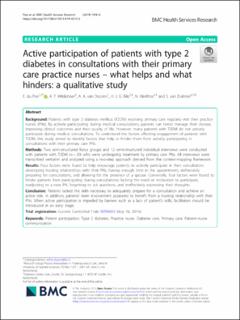Active participation of patients with type 2 diabetes in consultations with their primary care practice nurses – what helps and what hinders: a qualitative study
du Pon, Esther; Wildeboer, Anita T; van Dooren, Ad; Bilo, Henk JG; Kleefstra, Nanne; van Dulmen, Sandra
Peer reviewed, Journal article
Published version
Permanent lenke
https://hdl.handle.net/11250/2646573Utgivelsesdato
2019Metadata
Vis full innførselSamlinger
Sammendrag
Background:Patients with type 2 diabetes mellitus (T2DM) receiving primary care regularly visit their practicenurses (PNs). By actively participating during medical consultations, patients can better manage their disease,improving clinical outcomes and their quality of life. However, many patients with T2DM do not activelyparticipate during medical consultations. To understand the factors affecting engagement of patients withT2DM, this study aimed to identify factors that help or hinder them from actively participating inconsultations with their primary care PNs.Methods:Two semi-structured focus groups and 12 semi-structured individual interviews were conductedwith patients with T2DM (n= 20) who were undergoing treatment byprimary care PNs. All interviews weretranscribed verbatim and analyzed using a two-step approach derived from the context-mapping framework.Results:Four factors were found to help encourage patients to actively participate in their consultation:developing trusting relationships with their PNs,having enough time in the appointment, deliberatelypreparing for consultations, and allowing for the presence of a spouse. Conversely, four factors were found tohinder patients from participating during consultations: lacking the need or motivation to participate,readjusting to a new PN, forgetting to ask questions, and ineffectively expressing their thoughts.Conclusion:Patients lacked the skills necessary to adequately prepare for a consultation and achieve anactive role. In addition, patients’keen involvement appeared to benefit from a trusting relationship with theirPNs. When active participation is impeded by barriers such as a lack of patient’s skills, facilitators should beintroduced at an early stage.
Beskrivelse
Open Access This article is distributed under the terms of the Creative Commons Attribution 4.0 International License which permits unrestricted use, distribution, and reproduction in any medium, provided you give appropriate credit to the original author(s) and the source, provide a link to the Creative Commons license, and indicate if changes were made.

